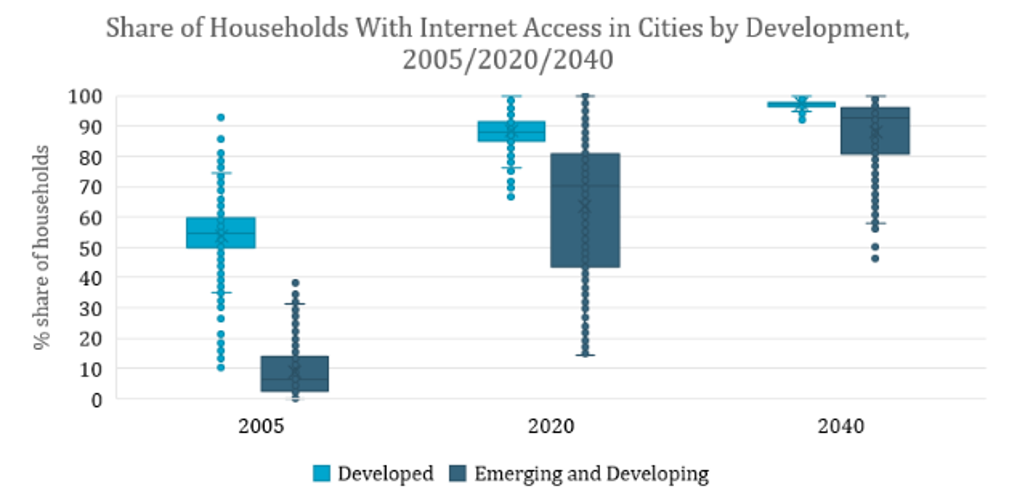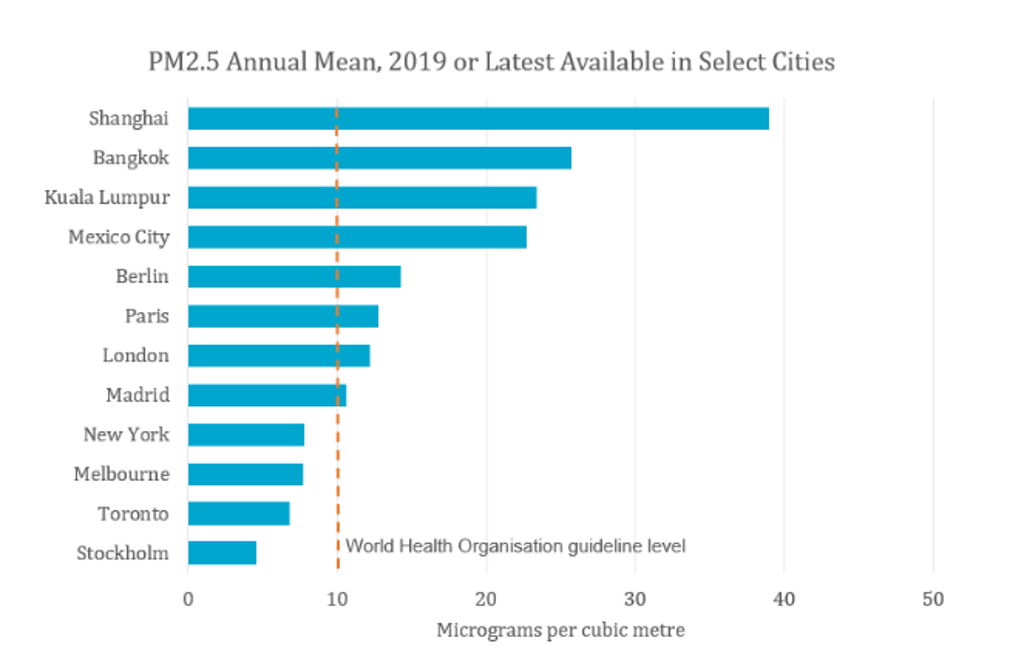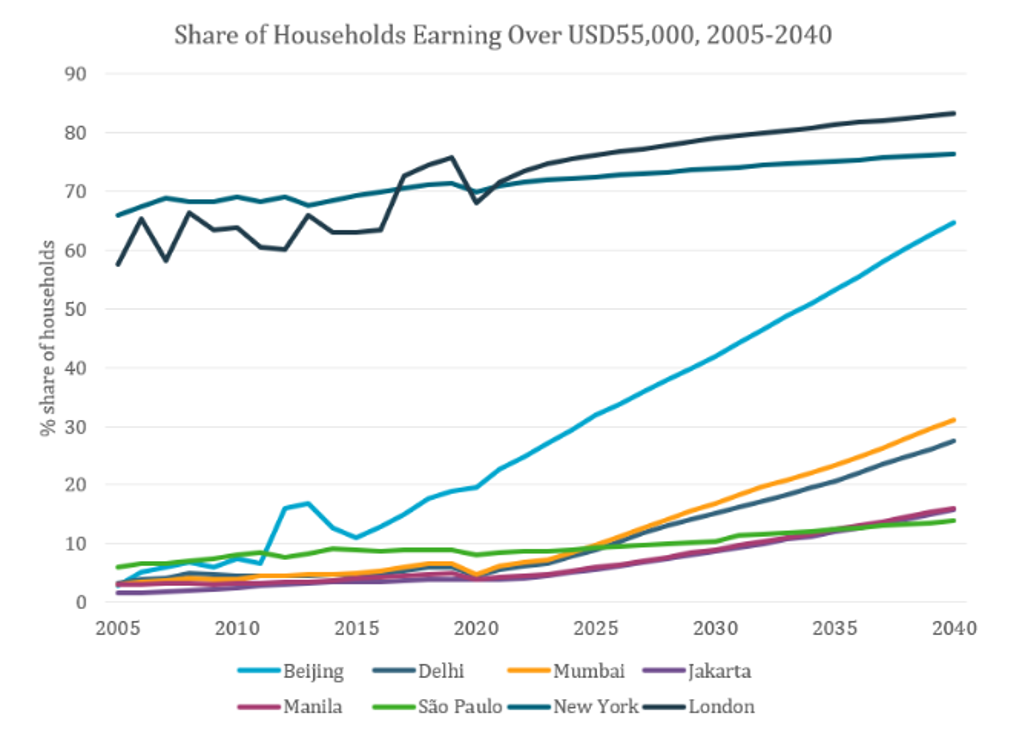Euromonitor International has identified five main trends that are shaping the future of cities: Digitalisation and connectivity, sustainability, smart planning, rapid growth in emerging and developing markets and clean and frictionless mobility.
These trends stem from numerous factors, such as rising urbanisation, growing sustainability demands and improving technologies. Keeping pace with these trends will be critical for many, including businesses tasked with navigating these changing urban dynamics in order to deliver effective business strategies, and governments that will be required to implement regulatory policies in accordance with these key trends.
Digital and connected cities
The trend towards more digital and connected cities reflects the use of the internet and the internet of things (IoT) in delivering better organisation and provision of urban services. Over the last two decades, internet access has surged as governments have increased investment in supplying better and faster access.
Between 2005-2020 the number of internet users rose 340%, reaching 4.2 billion in 2020 or 54% of the world’s population. By 2040, 88% of the global population will use the internet.
Government policies for smart city development will become more robust as urbanisation is expected to put more stress on existing city assets. This is going to warrant tech businesses to draw closer ties with local and national governments in delivering smart city projects.
Also, consumers in urban areas will increasingly use internet-based tools to navigate their everyday lives, such as paying for utilities, accessing public transport or monitoring air pollution.

Source: Euromonitor International from national statistics/International Telecommunications Union (ITU)
Sustainable cities
Climate change is forcing a new agenda on urban sustainability. This is being pushed ahead by international organisations such as the UN, which has included sustainable cities and communities as one of the 17 UN goals for sustainable development by 2030. Cities take up approximately 4% of the world’s land area, yet they account for 70% of all CO2 emissions, according to the World Wide Fund for Nature.
Governments that have signed up to the Paris Agreement on climate change will be pushed to deliver strict regulations that seek a reduction in global carbon emissions. Businesses will need to follow these requirements and deliver strategies that are both profitable and accommodate strict sustainability mandates.

Source: Euromonitor International from US Environmental Protection Agency/European Environmental Agency/national statistics
Smart urban planning
The concept of the 15-minute city, which focuses on localising essential services and delivering mixed land use, will change commuting, shopping, leisure and work patterns for urban citizens.
Having the ability to access work, school, clinics, grocery stores, postal services, and other services within a 15-minute walk or bicycle ride is going to drive the future of urban planning. Smart urban planning also incorporates more modern urban plans that favour walking and cycling and increase the availability of green spaces in cities.
The consumer movement in cities will change as more people will have access to essential needs in their local areas. This will usher in a larger mix of businesses in local neighbourhoods and mitigate the need for long-distance commutes to access daily amenities.
Emerging and developing cities
Cities in developing and emerging markets have witnessed tremendous economic growth which has not only lifted many people out of poverty but has also established new urban middle classes.
Cities in China, India and Indonesia have seen incomes surge over the last 20 years thanks to infrastructure investment, expanding internet use and income growth. Smaller cities are also becoming more attractive thanks to their lower costs.
The swift growth of emerging and developing cities is delivering business opportunities and is helping to diversify away from developed cities, which may not be providing high growth due to stagnating incomes and low population growth.

Source: Euromonitor International from national statistics
Frictionless and clean mobility
Clean and seamless mobility will change urban mobility in the future. Clean mobility will focus on increasing the use of electricity, hydrogen and other non-fossil fuels to power vehicles. A growing number of governments are placing restrictions on cars running on fossil fuels and in the future permanent bans on their use are expected.
From the frictionless perspective, new solutions to travel have emerged such as shared mobility (ride-hailing, car-sharing, etc) and mobility-as-a-service, which are helping to solve the issue of the first and last-mile. Technological innovation will make journeys more efficient with algorithms providing users with the fastest and most cost-effective travel solutions in cities.
Businesses in the automotive industry, which have traditionally developed passenger cars powered by fossil fuels, will need to quickly adjust and transition to electric or alternative fuels.
At the same time, the growing penetration of the internet and smartphones coupled with lower demand for passenger car ownership will influence people to utilise shared forms of mobility, such as shared electric scooters or car services.
For more analysis please read our full report Global City Trends.
